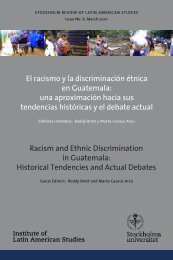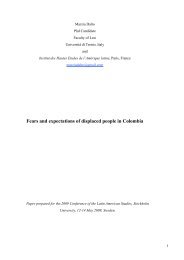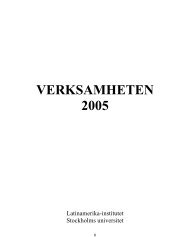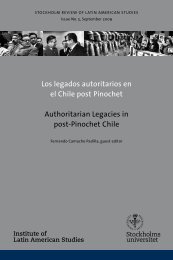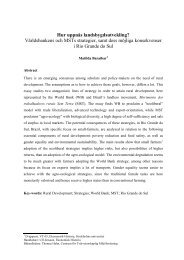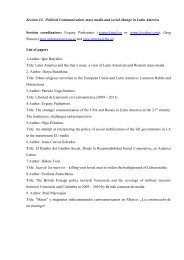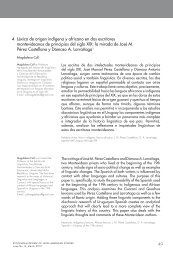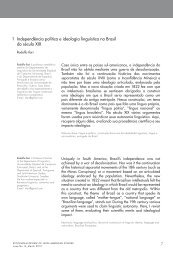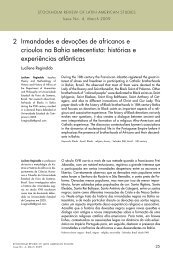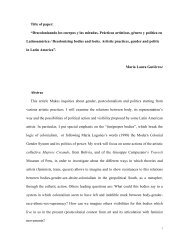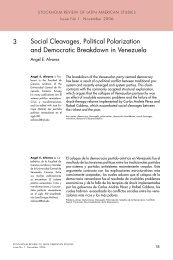Venezuelan Politics and Society in Times of Chavismo PolÃtica y ...
Venezuelan Politics and Society in Times of Chavismo PolÃtica y ...
Venezuelan Politics and Society in Times of Chavismo PolÃtica y ...
You also want an ePaper? Increase the reach of your titles
YUMPU automatically turns print PDFs into web optimized ePapers that Google loves.
Has <strong>Venezuelan</strong> Decentralization Sur vived <strong>Chavismo</strong><br />
Rickard O. Lal<strong>and</strong>er<br />
Introduction<br />
Decentralization is not meant to satisfy the bureaucratic<br />
appetites neither <strong>of</strong> political parties nor <strong>of</strong> pressure<br />
groups. Therefore, the best option is to create a<br />
new federalism. (…) The Constituyente [Constitutional<br />
revision] will create an impulse towards a new federalism<br />
that will guarantee the participation <strong>of</strong> the states,<br />
regions <strong>and</strong> municipalities (Hugo Chávez). 1<br />
The most impact<strong>in</strong>g political reform <strong>of</strong> modern<br />
democratic Venezuela was decentralization, implemented<br />
s<strong>in</strong>ce 1989. Decentralization brought a<br />
deepen<strong>in</strong>g <strong>of</strong> democracy through the open<strong>in</strong>g <strong>of</strong> the<br />
political system with the direct election <strong>of</strong> local <strong>and</strong><br />
regional political authorities. As seen <strong>in</strong> the quotation<br />
above, as early as the electoral campaign <strong>of</strong><br />
1998, Hugo Chávez Frías was critical towards the<br />
function<strong>in</strong>g <strong>of</strong> decentralization <strong>and</strong> likewise he was<br />
rapidly accused <strong>of</strong> be<strong>in</strong>g the re-centralist option<br />
<strong>and</strong> the enemy <strong>of</strong> the decentralization process. This<br />
<strong>in</strong>cludes his question<strong>in</strong>g whether the autonomy <strong>of</strong><br />
state <strong>and</strong> municipal governments is excessive. The<br />
new Constitution <strong>of</strong> 1999 was supposed to correct<br />
these defects along with some feudal legacies from<br />
the colonial tradition, <strong>and</strong> to make central government<br />
<strong>in</strong>tervention <strong>in</strong> municipal <strong>and</strong> state territories<br />
easier.<br />
In this essay, certa<strong>in</strong> aspects <strong>of</strong> the dest<strong>in</strong>y <strong>of</strong><br />
<strong>Venezuelan</strong> decentralization s<strong>in</strong>ce Chávez came to<br />
power will be revised. Most analysts have unfairly<br />
belittled the importance <strong>of</strong> the decentralization reform<br />
<strong>and</strong> its repercussions <strong>in</strong> <strong>Venezuelan</strong> politics<br />
<strong>and</strong> society. The decentralization processes from<br />
1989 onwards brought with it a series <strong>of</strong> implications<br />
for the <strong>Venezuelan</strong> political <strong>and</strong> democratic<br />
system, <strong>in</strong>clud<strong>in</strong>g dramatic <strong>and</strong> pr<strong>of</strong>ound changes<br />
<strong>in</strong> the party system, which experienced a transformation<br />
from a bipartisan system to multi-partyism<br />
dur<strong>in</strong>g the first decade <strong>of</strong> a decentralized system,<br />
with significant changes <strong>in</strong> effective political contention<br />
between parties on dist<strong>in</strong>ct political-territorial<br />
levels. S<strong>in</strong>ce democratization <strong>in</strong> 1958, the political<br />
system has been dom<strong>in</strong>ated by two political parties,<br />
the social democratic AD (Acción Democrática)<br />
<strong>and</strong> Christian democratic COPEI (Comité de Organización<br />
Política Electoral Independiente). Both<br />
AD <strong>and</strong> COPEI have by tradition been strongly centralized<br />
parties. Historically, these two parties have<br />
dom<strong>in</strong>ated national politics, <strong>of</strong>ten through strategic<br />
pacts <strong>and</strong> alliances. Between 1973 <strong>and</strong> 1988 these<br />
two together managed to capture between 80 <strong>and</strong><br />
93 percent <strong>of</strong> the vote <strong>in</strong> every presidential election.<br />
S<strong>in</strong>ce the late 1980’s, however, this bipartisan hegemonic<br />
system, <strong>of</strong>ficially nom<strong>in</strong>ated partyarchy (partidocracia)<br />
has suffered an underm<strong>in</strong><strong>in</strong>g <strong>and</strong> challenges<br />
from other political actors. Non-traditional<br />
political parties like the socialist MAS (Movimiento<br />
Al Socialismo) <strong>and</strong> Causa R (Causa Radical) 2 have<br />
emerged, also with<strong>in</strong> the decentralization scheme.<br />
These parties have seen victories <strong>in</strong> several municipalities<br />
<strong>and</strong> federal states <strong>in</strong> the elections <strong>of</strong> mayors<br />
<strong>and</strong> governors respectively, thus threaten<strong>in</strong>g the<br />
almost hegemonic position <strong>of</strong> the two traditional<br />
parties (AD <strong>and</strong> COPEI). The municipal, regional<br />
<strong>and</strong> national elections <strong>of</strong> 1998 <strong>and</strong> 2000 changed<br />
the political panorama <strong>in</strong> Venezuela even more dramatically.<br />
Several entirely new political parties have<br />
emerged. The MVR (Movimiento V República) <strong>of</strong><br />
current President Hugo Chávez Frías presents the<br />
most dramatic <strong>and</strong> rapid rise <strong>in</strong> this context. But<br />
similarly, parties associated with decentralization,<br />
like Proyecto Venezuela, with regional roots <strong>in</strong> the<br />
important <strong>in</strong>dustrial state <strong>of</strong> Carabobo, Leftist Patria<br />
Para Todos –PPT– (Fatherl<strong>and</strong> For All) <strong>and</strong> the<br />
recently founded Primero Justicia, rooted <strong>in</strong> the Caracas<br />
area, are a few examples <strong>of</strong> parties that have<br />
achieved <strong>in</strong>creased political <strong>in</strong>fluence.<br />
Decentralization without doubt shook up the<br />
party system at all political-territorial levels. One<br />
additional objective <strong>of</strong> the reform was the democratization<br />
<strong>of</strong> the political parties. From that perspective,<br />
the l<strong>in</strong>k between decentralization <strong>and</strong> the<br />
transformation <strong>of</strong> the party system can be seen <strong>in</strong><br />
an actual purpose <strong>of</strong> the reform. That is, chang<strong>in</strong>g<br />
1 Interviewed <strong>in</strong> El Universal, 15 September 1998 (my italics).<br />
2 Both MAS <strong>and</strong> Causa R were formed as consequences <strong>of</strong><br />
a split <strong>in</strong> 1971 <strong>of</strong> the <strong>Venezuelan</strong> Communist Party – PCV<br />
– (Partido Comunista de Venezuela).<br />
Stockholm REVIEW OF Lat<strong>in</strong> American Studies<br />
Issue No 1. November 2006<br />
30



